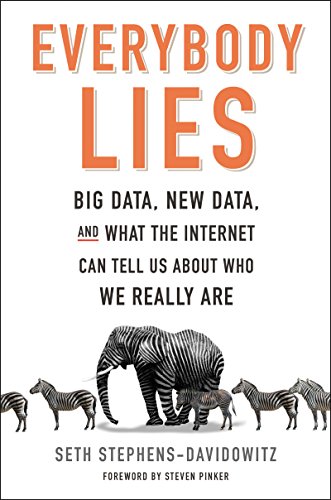Everybody Lies: Big Data, New Data, and What the Internet Can Tell Us About Who We Really Are Link to heading
Summary Link to heading
“Everybody Lies: Big Data, New Data, and What the Internet Can Tell Us About Who We Really Are” by Seth Stephens-Davidowitz explores the hidden world of online data and its ability to reveal truths about human behavior and society that traditional surveys and social data miss. Using examples from data sourced from Google searches, social media, and other online platforms, the author uncovers biases, fears, desires, and behaviors that people tend to conceal from others. The book argues that the vast digital information we generate can be used to enhance our understanding of everything from economics to public health.
Review Link to heading
Seth Stephens-Davidowitz’s work has been praised for its accessible writing style, making complex data science concepts understandable to a general audience. The book effectively demonstrates the power of big data in revealing societal truths, underpinned by a plethora of real-world examples. While insightful, some critics have noted that the book may place too much emphasis on the uniqueness of data derived from internet sources over traditional data collection methods. Nevertheless, the book has been influential in sparking discussions on the ethical implications of data use and privacy.
Key Takeaways Link to heading
- Power of Big Data: Online data sources can yield insights into human behavior that are more accurate than traditional survey methods.
- Hidden Truths: What people search for online often reveals true feelings and desires that they might not admit publicly.
- Broader Applications: Data analysis can be applied across various fields to solve problems, predict trends, and improve decision-making.
- Privacy Concerns: The book emphasizes the ongoing debate around privacy and ethical use of data, highlighting the need for careful consideration.
Recommendation Link to heading
“Everybody Lies” is highly recommended for data enthusiasts, social scientists, marketers, and anyone interested in understanding the potential of big data to uncover real human behavior. Its compelling insights and approachable style make it suitable for readers without a technical background who are curious about the implications of big data in modern society.
